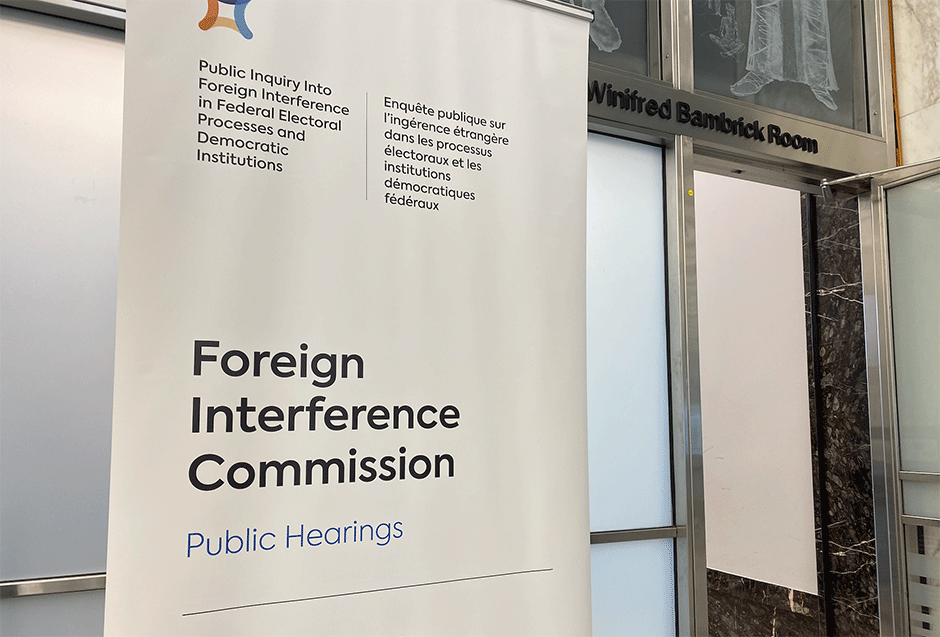
Credit: Image via www.vpnsrus.com
Parliament can’t fix the Minister’s rushed, confused and flawed Bill; full public consultation needed now.
APRIL 24, 2024 — Today, nearly 60 leading civil society organizations, corporations, experts and academics released an open letter to Innovation, Science and Industry Minister François-Philippe Champagne, calling for the Artificial Intelligence and Data Act (AIDA) to be withdrawn and given a full public consultation. AIDA is currently bundled into the government’s proposed privacy legislation, Bill C-27, resulting in what the letter describes as a “hasty, confusing, and rushed” study by the House of Commons Industry and Technology Committee, and a “fundamentally flawed bill which lacks democratic legitimacy.”
The open letter sharply criticizes the government’s introduction of AIDA without the open public consultation process warranted for such highly impactful legislation. Stakeholders were not given any opportunity to hear what the government had in mind and to lay out their concerns and hopes for AI legislation before it was introduced. Furthermore, the government promised a major rewrite of much of AIDA on the first day of committee consideration, catching off guard both stakeholders who were attempting to participate, and committee MPs themselves. Some stakeholders were forced to rework and resubmit their input in response to the revised proposal, while others denied a formal feedback window raised fundamental unanswered questions about AIDA’s current design and objectives.
The letter follows on September and December communications to the Minister raising serious concerns, but significantly increases the signatory count of past letters. The signatories, who reflect a diverse range of civil society groups, think tanks, and businesses, ask the government to:
- Withdraw AIDA from Bill C-27 and initiate a thorough and inclusive public consultation with ample time for submissions from various stakeholders and incorporation of their feedback;
- Reintroduce a revised and improved AIDA that addresses the concerns raised from the start.
Some signatories of today’s letter have also endorsed a March 2024 package of bare minimum recommended changes to AIDA, in the event that the government insists on pushing forward with the current bill.
Today’s letter follows on the government’s budget announcement of a $5.1 million fund for the AI and Data Commissioner proposed in AIDA, just 1/8th of what the Office of the Privacy Commissioner receives. This amount also pales in comparison to the government’s $2 billion budgeted investment for stimulating the AI industry, reflecting the government’s unbalanced priorities for AI.
In the past two years, more than 20,000 signatures and letters were sent to government officials calling for effective legislation to address the impacts of AI and facial recognition. Since November 2021, more than 34,000 signatures have been collected by OpenMedia petitions calling for new privacy laws in Canada, and more than 17,800 messages have been sent to the government calling for enhanced personal privacy protections.
The Joint Letter has been signed by:
Organizations:
- Amnesty International Canadian Section (English-speaking)
- BC Civil Liberties Association
- Canadian Arab Federation
- Canadian Civil Liberties Association
- Canadian Muslim Public Affairs Council
- Center for Digital Rights
- Center for Free Expression
- Communications Program, Glendon College, York University
- Digital Public
- National Federation of Teachers of Quebec (FNEEQ-CSN)
- Firearms Institute for Rational Education
- International Civil Liberties Monitoring Group
- InterPares
- Just Peace Advocates/Mouvement Pour Une Paix Just
- League of Rights and Freedoms
- Macdonald-Laurier Institute
- Mines Action Canada
- National Union of Public and General Employees (NUPGE)
- NSTP Consulting Corp.
- OpenMedia
- Privacy and Access Council of Canada
- Public Interest Advocacy Center
- Response Marketing Association
- Rideau Institute on International Affairs
- Tech Reset Canada
Individuals:
- Alessandra Renzi, Associate Professor, Concordia University
- Alexandra Flynn, Associate Professor, UBC
- Andrew Clement, Professor emeritus, University of Toronto
- Azeezah Kanji, legal academic and journalist
- Bianca Wylie, writer and public technology advocate
- Dr. Blayne Haggart, Associate Professor, Department of Political Science, Brock University
- Dr. Brenda McPhail, Public Policy Program, McMaster University
- Christelle Tessono, Technology Policy Researcher University of Toronto
- Dr. Colin Bennett, University of Victoria
- Daniel Konikoff, University of Toronto
- Evan Light, Associate Professor, York University
- Fenwick McKelvey, Associate Professor, Concordia University
- Jane Bailey, Professor, University of Ottawa Faculty of Law
- Joanna Redden, Associate Professor, Western University
- Jonathan Obar, Associate Professor, York University
- Jonathan Roberge, full professor, INRS
- Dr. Kate Milberry
- Dr. Kate Tillecczek, York University
- Dr. Kristen Thomasen, Assistant Professor, UBC
- Leslie Shade, Faculty of Information, University of Toronto
- Luke Stark, Assistant Professor, Western University
- Mariette Pilon, lawyer, member of the Quebec Bar
- Dr. Mary Ott, Assistant Professor, York University
- Matt Malone, Assistant Professor, Thompson Rivers University
- Natasha Tusikov, Associate Professor, Department of Social Science, York University
- Nicole St-Pierre, President, NSTP Consulting Corp.
- Nkechi E. Agugoesi, Internationally Trained Lawyer
- Ori Freiman, Digital Society Lab at McMaster University
- Sara M. Grimes, Professor, University of Toronto
- Dr. Sava Saheli Singh, York University
- Sharon Polsky, President of the Privacy and Access Council of Canada
- Spencer Izen, Researcher, BC Freedom of Information and Privacy Association
- Sun-ha Hong, Assistant Professor, Simon Fraser University
- Tamir Israel, Technology & Human Rights Lawyer
Selected Quotes:
“Ensuring that artificial intelligence tools, especially those that have the potential to impact crucial and sensitive areas of people’s lives, are properly regulated is essential. This is especially true for those used by law enforcement and national security agencies. The government’s lack of public consultation on this bill means these risks are not being properly addressed. AIDA is not up to task, and needs to be withdrawn.” – Tim McSorley, National Coordinator at the International Civil Liberties Monitoring Group
“Artificial intelligence may be one of the most impactful developments of our times– but that makes it crucial that our government regulates it right, not first. Through AIDA’s time in parliament we’ve seen the government bill largely rewritten by the own amendments, and critical stakeholders across civil society and corporate space report their feedback was hurriedly solicited after AIDA was designed, if at all. We believe Canadians deserve a better, more considered process than this, with all feedback fully and publicly accounted for.”- Matt Hatfield, Executive Director, OpenMedia
“AIDA is a disaster for privacy and human rights. The Parliamentary process is a disaster for democracy and Reconciliation.” — Noa Mendelsohn Aviv, Executive Director, Canadian Civil Liberties Association
“The Industry Minister introduced AIDA in the absence of any public consultations, either with independent experts or Canadians more generally, resulting in deeply problematic legislation with widespread negative implications. The Minister’s recently proposed amendments appear informed mainly by meetings with industry insiders but not a single organization representing those most likely to be affected by AI application. It is hardly surprising then that the re-written Bill fails to correct its fundamental flaws. AIDA needs a reset with a proper democratic process.” — Andrew Clement, Professor emeritus, University of Toronto
“AI legislation should treat privacy as a fundamental right and guiding principle. AIDA treats it as an afterthought. Canadians deserve a better law, one that could only result from a better process.”— Aislin Jackson, Policy Staff Counsel, BC Civil Liberties Association
“Further consultations are necessary, not only because it is the right thing to do, but particularly at such a pivotal point in time, when citizens are questioning democratic practices more and more.” — Nicole St-Pierre, President, NSTP Consulting Corp.
“This open letter is a collective call to separate AIDA from Bill C-27 and redraft it. It is not only about improving procedural integrity but also ensuring legislation is crafted to follow the wisdom of the Canadian Mosaic. Additional consultation is necessary. With AI, it is better to get the Act right than get it fast.” — Ori Freiman, Digital Society Lab at McMaster University
– 30 –
Media Contacts
Tim McSorley
National Coordinator, International Civil Liberties Monitoring Group
1 (613) 241-5298
nationalcoordination@iclmg.ca
Matt Hatfield
Executive Director, OpenMedia
1 (888) 441-2640 ext. 0
matt@openmedia.org
Aislin Jackson
BC Civil Liberties Association
1 (604) 687-2919, ext. 116
aislin@bccla.org
John Lawford
Executive Director, the Public Interest Advocacy Center
1 (613) 562-4002
jlawford@piac.ca
Andrew Clement
Professor Emeritus, University of Toronto
1 (250) 526-3029
andrew.clement@utoronto.ca
Since you’re here…… we have a small favour to ask. Here at ICLMG, we are working very hard to protect and promote human rights and civil liberties in the context of the so-called “war on terror” in Canada. We do not receive any financial support from any federal, provincial or municipal governments or political parties. You can become our patron on Patreon and get rewards in exchange for your support. You can give as little as $1/month (that’s only $12/year!) and you can unsubscribe at any time. Any donations will go a long way to support our work. |




